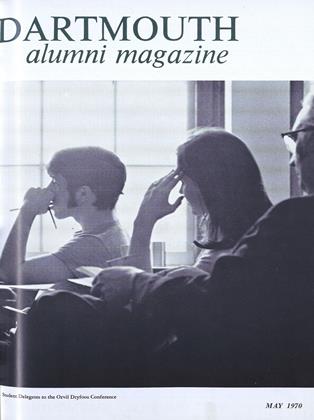WITH 200 STUDENT DELEGATES participating and stating their views on the course American foreign policy should follow in the new decade, this year's Orvil E. Dryfoos Conference on Public Affairs took a new tack. Larger and more public than the previous five gatherings of experts from government, universities, and private organizations, this year's conference constituted the third of the Bicentennial academic events of 1969-70 and was sponsored by the Division of the Social Sciences.
The foreign policy experts who took part in the three plenary sessions, April 16-17, are shown in the photographs on these pages. After a series of group meetings, the students presented their own foreign policy document at the closing session.
The annual conference, inaugurated in 1964, is a memorial to the late Orvil E. Dryfoos '34, publisher of The New York Times and a Dartmouth Trustee from 1957 until his death in 1963.
Prof. Cyril E. Black of Princeton (r), speaker, and discussantsLucian W. Pye of M.I.T. (c) and Harald B. Malmquist of theOverseas Development Council, who were experts for thepanel on "Theories of Political Development."
Student delegates from the U. S. Naval Academy'
Members of the panel on "Concepts of Communism" (l to r):Chairman Henry L. Roberts, Dartmouth; speaker FranzSchurman, University of California; and discussants Seth Tillman, consultant to the Senate Foreign Relations Committee,and Zbigniew Brzezinski of Columbia University.
Prof. Gene M. Lyons of Dartmouth, conference chairman, leading a student seminar.
Student seminar delegates reporting at final session.
An afternoon discussion group on Baker's lawn.
Dr. Roger Hilsman (l) of Columbia University and Dr. WalterLaFeber of Cornell, who were discussants for the session on"Approaches to Military Strategy."
Dr. Brzezinski at Hopkins Center reception
 View Full Issue
View Full Issue
More From This Issue
-
 Feature
FeatureA CHANCE FOR THE PENTAGON TO HELP SOLVE SOME DOMESTIC AS WELL AS MILITARY PROBLEMS
May 1970 By GERALD G. GARBACZ '58 -
 Feature
FeatureThe Great Love Affair Between Students and Films
May 1970 By MAURICE H. RAPF '35 -
 Feature
FeatureProject IMPRESS
May 1970 By JOANNA STERNICK -
 Article
ArticleThe Undergraduate Chair
May 1970 By WINTHROP A. ROCKWELL '70 -
 Article
ArticleThe Faculty
May 1970 By WILLIAM R. MEYER -
 Class Notes
Class Notes1921
May 1970 By HAROLD F. BRA MAN, WILLIAM M. ALLEY
Features
-
 Feature
FeatureIndustry Galls On the Liberal Arts
October 1956 -
 Feature
FeatureFROM THE DESK OF THE PRESIDENT
APRIL • 1985 -
 Cover Story
Cover StoryFred McFeely Rogers 1950
NOVEMBER 1990 -
 Feature
FeatureBAKER'S DOZEN
March 1996 -
 Feature
FeatureOn The Water
Jul/Aug 2004 By JIM COLLINS '84 -
 Cover Story
Cover StoryWelcoming the Loner
SEPTEMBER 1988 By Victor F. Zonana '75


